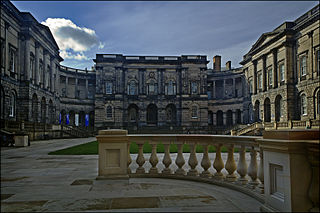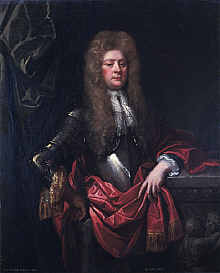George Gordon, 1st Earl of Aberdeen, was a Lord Chancellor of Scotland.

Earl of Stair is a title in the Peerage of Scotland. It was created in 1703 for the lawyer and statesman John Dalrymple, 2nd Viscount of Stair.

James Dalrymple, 1st Viscount Stair was a Scottish lawyer and statesman, and a key influence on the Scottish Enlightenment. He was a leading figure of Scottish law, "and also one of the greatest thinkers on law across Europe has ever produced".

Edinburgh Law School, founded in 1707, is a school within the University of Edinburgh, Scotland, United Kingdom dedicated to research and teaching in law. It is located in the historic Old College, the original site of the University. Two of the twelve currently sitting Supreme Court of the United Kingdom justices are graduates of Edinburgh, including the current President and Deputy President.

John Dalrymple, 1st Earl of Stair PC was a Scottish politician and lawyer. As Joint Secretary of State in Scotland 1691–1695, he played a key role in suppressing the Jacobite rising of 1689 and was forced to resign in 1695 for his part in the Massacre of Glencoe. Restored to favour under Queen Anne in 1702 and made Earl of Stair in 1703, he was closely involved in negotiations over the 1707 Acts of Union that created the Kingdom of Great Britain but died on 8 January 1707, several months before the Act became law.

Sir Hew Dalrymple, Lord North Berwick (1652–1737) was a Scottish judge and politician.

The Selden Society is a learned society and registered charity concerned with the study of English legal history. It functions primarily as a text publication society, but also undertakes other activities to promote scholarship within its sphere of interest. It is the only learned society wholly devoted to the topic of English legal history.

The inter regalia are the rights falling to the Crown in Scots Property law. The term derives from Latin inter (among) and regalia.
Events from the year 1691 in the Kingdom of Scotland.
Events from the year 1695 in the Kingdom of Scotland.

The Dundee Law School is the law school of the University of Dundee in Scotland. It provides undergraduate and postgraduate teaching in Scots and English law, permitting students to qualify into all three United Kingdom legal jurisdictions. The law school traces its roots to the University of St. Andrews, and has placed in the top 15 law schools in the UK on the University League Tables. The school is based in the Scrymgeour Building—named for Henry Scrymgeour, a 16th-century legal philosopher from Dundee—while the Law Library is based in the libraries building, both on the university's main campus. The Law School is part of the wider School of Social Sciences, Humanities and Law at Dundee.

The School of Law at the University of Glasgow provides undergraduate and postgraduate courses in Law, and awards the degrees of Bachelor of Laws, Master of Laws, LLM by Research, Master of Research (MRes) and Doctor of Philosophy, the degree of Doctor of Laws being awarded generally only as an honorary degree.

The University of Aberdeen School of Law is the law school of University of Aberdeen, located in Aberdeen, Scotland. Established in 1495, it is consistently ranked among the top 10 law schools in the United Kingdom.
David Maxwell Walker was a Scottish lawyer, academic, and Regius Professor of Law at the University of Glasgow.
The Laws of Scotland: Stair Memorial Encyclopaedia is an encyclopaedia of law in Scotland. It incorporates law derived from every source and, while concentrating on the specialities of Scots law, it also covers law common to the whole of the United Kingdom. Each statement of law is supported by citation of authority, and there are references to sources of further information, both primary and secondary. The Encyclopaedia may be cited with approval before the courts.

Scots law is the legal system of Scotland. It is a hybrid or mixed legal system containing civil law and common law elements, that traces its roots to a number of different historical sources. Together with English law and Northern Irish law, it is one of the three legal systems of the United Kingdom. Scots law recognises four sources of law: legislation, legal precedent, specific academic writings, and custom. Legislation affecting Scotland and Scots law is passed by the Scottish Parliament on all areas of devolved responsibility, and the United Kingdom Parliament on reserved matters. Some legislation passed by the pre-1707 Parliament of Scotland is still also valid.

Aeneas James George Mackay was a Scottish lawyer and academic, known as a legal and historical writer.
Events from the year 1747 in Scotland.
Events from the year 1784 in Scotland.
Events from the year 1681 in the Kingdom of Scotland.












